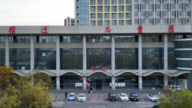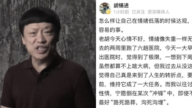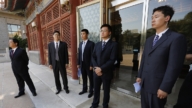【新唐人2011年12月8日訊】11月,中國製造業採購經理指數PMI顯示,佔中國生產總值約50%的製造業出現了將近三年來的首次收縮。新訂單和新出口訂單指數預示形勢還將惡化,目前工廠已經在減員、減少購買原材料和減產。學者指出,中國的多種政策都對中小企業不利,導致民營企業生存困難。
《法國國際廣播電臺》「當今世界」專欄指出,中國製造業已經失去優勢,世界工廠的地位正在受到多方面的撼動。全球性金融危機對中國出口帶來不可忽略的打擊,高科技成分不多的中國製造業,正在受到成本增高和加薪工潮增多的多重壓力。
北京天則經濟研究所副所長馮興元:「國家對其他基礎行業是有很大管制的,搞很多行政壟斷、國進民退,這些問題都存在。這樣的話,中國的東部地區民營企業家,他可以投資的領域是非常窄。」
這位經濟學者認為,國家的現行政策直接導致了東部民營企業的生存艱難。多種政策和地方政府的行政干預,都使勞動密集型的中小企業深受其害。同時,各種稅收的規範要求越來越多。
有資料顯示,在2004年至2009年之間,中國製造業單位勞動成本上漲了50%。
而英國《金融時報》報導說,一直以「世界工廠」聞名的中國沿海製造業產業帶,幾百萬家小工廠正受到成本持續上漲、勞動力緊缺、利潤率下滑以及海外訂單銳減等因素的全面擠壓,許多小型製造企業已到了經營不下去的地步。
經濟學者同意這種看法。他指出,中國東部沿海的企業主要集中在傳統型的電腦行業,競爭激烈,而且價格總體上也在不斷下降。同時,中共政權推行的多種政策導致公司成本增加,使得本來利潤很低的許多公司難以為繼。
北京天則經濟研究所副所長馮興元:「 我們的成本是上升的,無論是勞動力,還有其他資源的投入,中間消耗品的投入成本是上升的。 成本上去他可能關門嗎,或者減少僱用人員。所以不能單純的怪企業家,整個宏觀環境、中觀環境、微觀環境都發生了惡化。」
《法廣》專題認為,中共政府多年來一直大力阻止國有銀行體系向各種規模小、技術含量低的生產商放貸。當局的政策導致不少中小企業面臨信貸緊縮瀕臨破產的邊緣。像浙江地區一些中小企業被迫求助於利息可能高達70%至80%的地下錢莊,使企業無力擴大生產。同時,許多企業面臨工人不滿生產環境惡化和低工資而引發的罷工潮。中國作為過去被譽為安靜的「世界工廠」已經不存在了。
目前,全球需求下滑,加上來自一些鄰國的低成本競爭,中國製造業經營越來越艱難。
經濟學者指出,中國沿海企業需要大量的技術升級,尤其是向高端升級。
英國《金融時報》記者喬希•諾布爾指出,國企是中國經濟發展市場的主體,佔據了大量的優勢資源,但國企的高層考慮的是自己如何積纍更多的政治資本,從而在政治上更上層樓。這樣的目標選擇,決定了企業不是把精力放在研發設計、產品創新、品牌建設上,那樣可能自己栽樹後人乘涼。喬希•諾布爾認為,中國製造業向高端轉型,要走的路,還很長很長……
新唐人記者劉惠、宋風、黃容採訪報導。
Media Views to China: Problem of the “Workshop of the World"
China’s Purchasing Managers Index (PMI) shows that
in Nov. which accounted for 50% of GDP of the manufacturing sector has shrunk for first time in 3 years.
Data shows that both domestic and export orders are weakening,
with factories laying off workers, purchasing less raw materials and production.
Scholars point out that China’s various policies
are detrimental to small and medium businesses,
making it harder for private companies to survive.
Radio France International’s program, The World, said that
China’s manufacturing sector has lost its advantages,
its “workshop of the world" position is looking shaky.
The global financial crisis on China’s export businesses
can not be ignored. Low technology manufacturing
industries are facing huge pressures of higher costs on
raw material and pay rise disputes.
The vice director of Beijing Tianze Institute of Econonmics,
Feng Xingyuan: “China is highly regulated in basic industries,
and makes many trade monopolies, it benefits the
authorities but not the public.
So the private entrepreneurs in eastern China
have very limited investment areas.
Feng believes that the current policies directly creates more
difficulty of survival for private companies.
Various policies and local authorities’intervention damages
small and medium businesses.
Meanwhile, various tax regulation requirements
are growing more and more.
Official data shows that between the years from 2004 to 2009,
China manufacturing labour cost rose by 50%.
The British Financial Times reported that China’s coastal
manufacturing belt was known as the “workshop of the world”,
millions of small businesses are being squeezed on all sides by
rising costs, labour shortages, shrinking margins and a collapse in new orders from overseas.
Many small manufacturers face going out of business.
Feng Xingyuan agrees that China’s main coastal manufacturing
are in the traditional computer industry, they are competitive, additionally, prices keep falling.
Meanwhile, the Chinese Communist Party (CCP),
various policies have led to higher costs on raw materials,
making the low profitability of the companies difficult
to survive.
Feng: “Our capital are rising, including labour and
other investments, the consumable production cost is rising.
The rising costs of capital may cause businesses to close down,
or may lay off workers.
So we shouldn’t simply blame the entrepreneurs,
the whole environment of the economy has dropped down."
Radio France International said that the CCP vigorously
prevented the state-owned banking system to lend money to small and low technology businesses.
This state policy has led small and medium-sized businesses
facing bankruptcy.
Some small and medium-sized companies in Zhejiang have
to borrow money from loan sharks paying 70% to 80% interest rate, with no ability to expand the business.
Meantime, many industries are facing strikes due to
the poor working environment and low wages.
China is famous for its quiet “workshop of the world"
no longer exists.
At present, the global economy demand has declined,
in addition,
low-cost competition comes from border countries
causing China’s manufacturing sector more difficulties.
Feng says that China’s coastal businesses need to improve
technology, especially toward high-end technology.
Josh Noble, a reporter of British Financial Times,
pointed out that
state-owned industries are the foundation of China’s economy,
which takes advantage of main resources,
however, what the decision makers in state-owned companies
consider is to build up political power, to strengthen political position.
This motivation determines their major focus isn’t on
production development, innovative design,
and creating new models, otherwise the
next generation would benefit from it.
Josh Noble believes that for China’s manufacturing sector to
transform to high-end technology, still has a long way to go.
NTD reporters Liu Hui, Song Feng and Huang Rong.



























